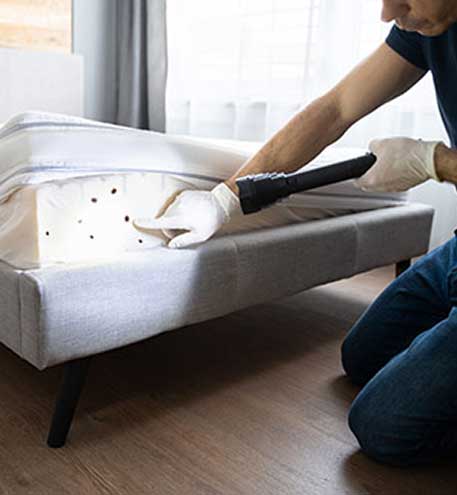Kinds Of Parasite Control: Which Approach Is Right for Your Infestation?
When encountered with a bug problem, the selection of an ideal method for pest control is crucial in efficiently taking care of the circumstance. From chemical therapies to organic solutions, there exists a variety of techniques that can be utilized to address different sorts of bugs. Each method includes its very own set of benefits and factors to consider, making the decision-making process a nuanced one. Recognizing the subtleties of each approach and reviewing their compatibility with the particular pest infestation handy is important for achieving lasting success in parasite management. By checking out the various types of parasite control methods available, individuals can make informed decisions tailored to their one-of-a-kind scenarios, making certain a much more sustainable and efficient result in parasite removal.
Chemical Bug Control
Chemical insect control entails using synthetic or naturally acquired chemicals to take care of and eradicate pest populations successfully. This technique is typically used in agriculture, forestry, and household settings to combat a wide variety of bugs, including weeds, rats, and pests. Making use of chemical pesticides can supply fast and targeted remedies to pest infestations, making it a popular choice for many people and businesses.
Among the essential advantages of chemical bug control is its capacity to quickly remove pests, lowering the risk of damages to plants, building, and human health and wellness. By utilizing certain chemicals that target certain insects, this method can successfully manage infestations while reducing injury to helpful microorganisms and the atmosphere when used appropriately.
Nevertheless, using chemical insect control additionally raises issues regarding potential adverse results on non-target species, water resources, and human health. It is important to follow security standards, apply chemicals sensibly, and consider different parasite control techniques to lessen these threats and guarantee lasting insect administration practices.
Biological Bug Control
Biological parasite control, additionally understood as biocontrol, utilizes living organisms to reduce and take care of parasite populations normally. This method utilizes the power of nature to control parasites without the requirement for synthetic chemicals. Biocontrol can entail the introduction of natural adversaries of the insect species, such as pathogens, bloodsuckers, or predators, to subdue pest populaces. By utilizing the parasite's natural killers or microorganisms, organic pest control uses a eco-friendly and lasting option to pest administration.

Mechanical Pest Control
Using physical and manual methods to handle bug populaces, mechanical bug control supplies an alternate method that does not depend on using living organisms or artificial chemicals. This approach entails the use of barriers, traps, or other devices to physically any pest control hinder or get rid of bugs. By obstructing insect access points or setting up traps to catch them, mechanical bug control can efficiently decrease problems without introducing chemicals right into the environment.
One usual instance of mechanical parasite control is the usage of mesh displays on doors and windows to protect against bugs from getting in buildings. This straightforward how to do pest control yet reliable method serves as a physical obstacle, keeping parasites out while enabling for proper ventilation. Furthermore, gadgets like mousetraps, fly swatters, and ultrasonic repellents fall under the mechanical pest control category.
While mechanical parasite control techniques can be labor-intensive and require regular tracking and upkeep, they provide a environmentally pleasant and lasting service for taking care of pest infestations. By integrating different mechanical techniques, residential property owners can create a comprehensive bug control approach that decreases reliance on chemical pesticides.
Physical Pest Control

Some typical physical insect control approaches include using barriers such as screens or internet to stop insect entry, traps to catch and eliminate insects, and hand-picking to physically eliminate bugs from plants or frameworks. In addition, methods like heat treatments can be utilized to control pests like bed bugs by increasing the temperature to levels that are dangerous to the pests.
Physical pest control is especially beneficial in incorporated insect administration (IPM) methods, where several parasite control techniques are integrated for reliable parasite administration while lessening making use of chemicals. By using physical insect control techniques, people can effectively attend to insect problems with marginal environmental effect.
Integrated Insect Management
When applying physical parasite control techniques as part of pest monitoring techniques, Integrated Pest Management (IPM) arises as a thorough strategy that leverages various strategies to successfully regulate pest populaces. IPM focuses on long-lasting prevention of parasites with a mix of organic, social, physical, and chemical devices tailored to specific bug issues. By incorporating multiple control techniques, IPM intends to decrease the dangers associated with pests while additionally minimizing reliance on chemical remedies.
One secret aspect of IPM is the emphasis on monitoring and analyzing pest populations to identify the most ideal control approaches. This positive technique allows for early treatment he said and targeted techniques, resulting in a lot more reliable insect management. Additionally, IPM advertises environmentally friendly methods by focusing on non-chemical control techniques and only utilizing pesticides as a last resort.
Conclusion

By using the parasite's all-natural predators or microorganisms, organic pest control provides a lasting and ecologically friendly service to pest monitoring. - Kings Bed bug exterminator Cincinnati
Making use of physical and manual approaches to manage pest populations, mechanical pest control provides an alternate strategy that does not rely on the usage of living organisms or artificial chemicals.An efficient approach to managing pest populations without counting on chemical or organic approaches entails the usage of physical insect control strategies.When applying physical insect control methods as part of bug administration techniques, Integrated Parasite Management (IPM) emerges as a detailed method that leverages numerous techniques to efficiently manage pest populations. Chemical bug control entails the use of chemicals, biological bug control uses natural killers, mechanical parasite control involves physical barriers, physical bug control includes capturing or getting rid of pests, and integrated insect management integrates multiple approaches for a holistic strategy to pest control.
Comments on “Professional Kings Bug Control Services Cincinnati OH”